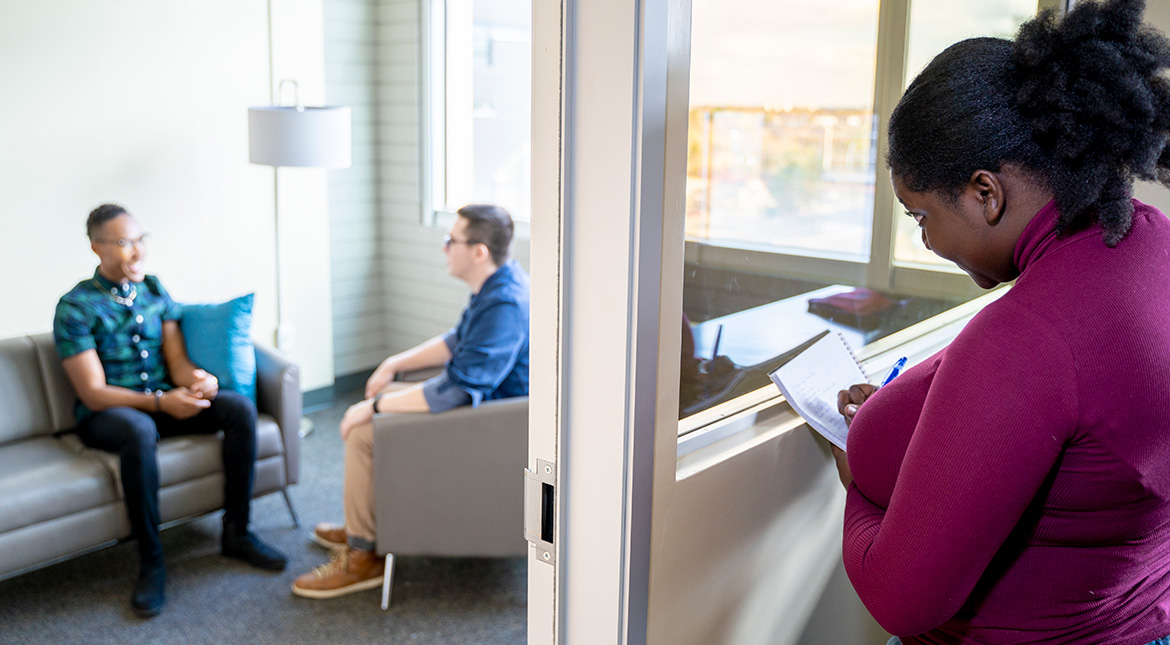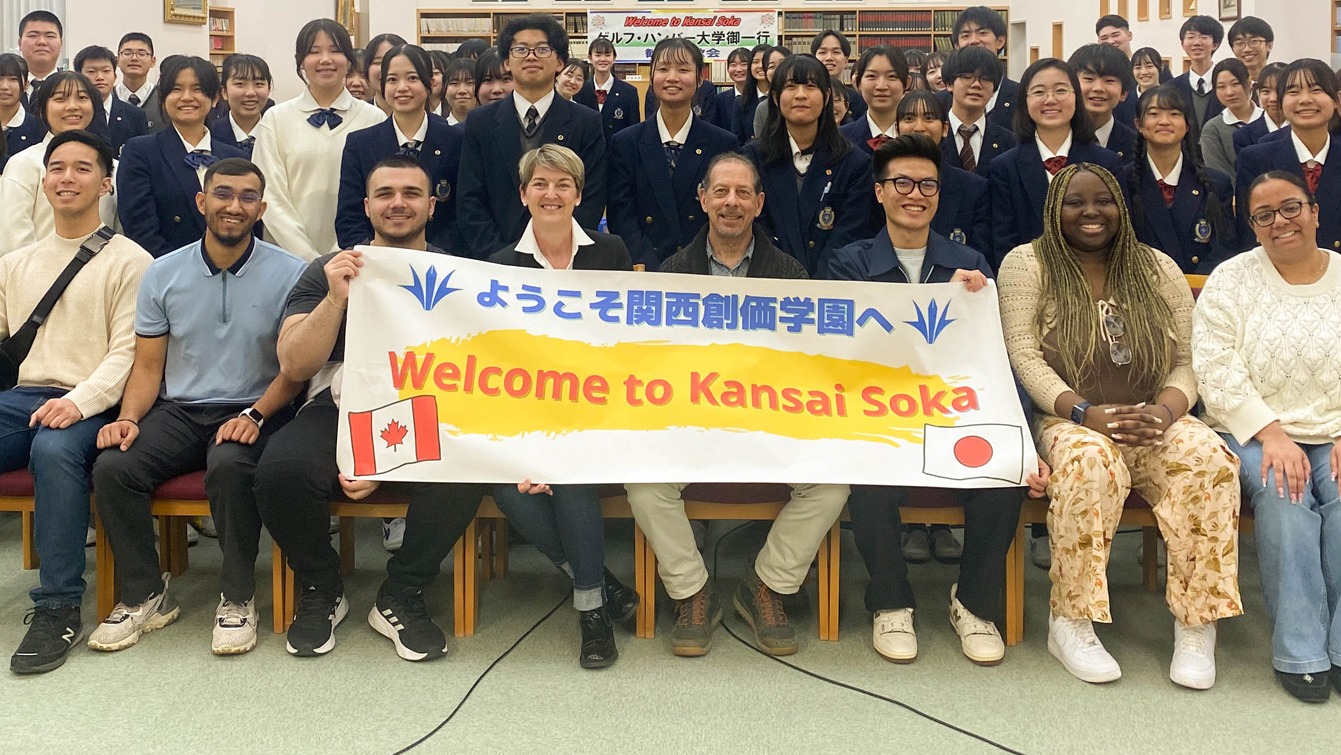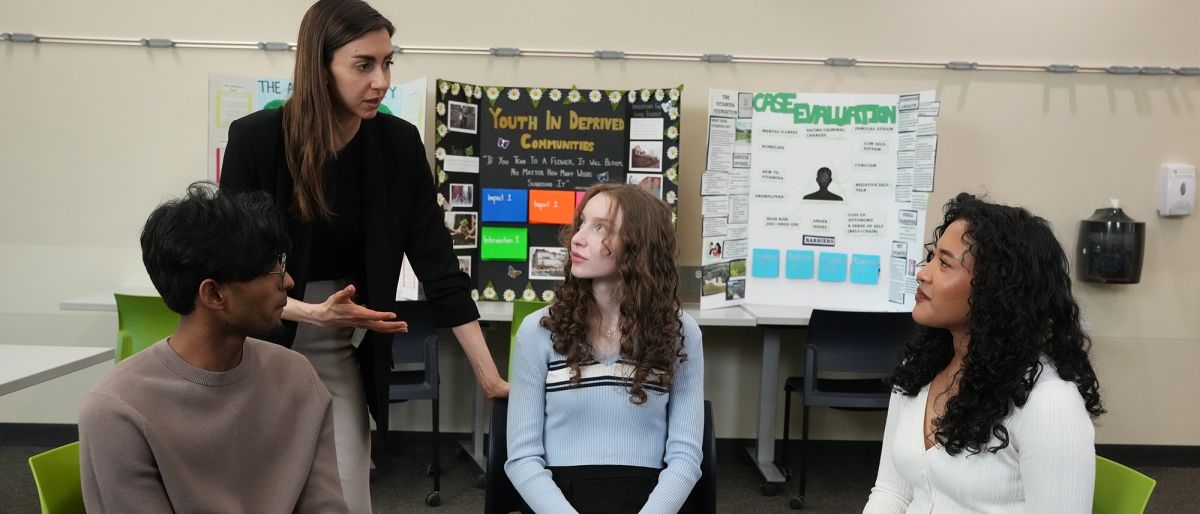Overview
You are motivated by the care and empathy you have for others.
Here, you’ll grow that compassion and sense of advocacy — expanding your impact from supporting individuals to influencing broader social and political change.
So, take this bold step toward building a better world. Go be a change maker.

Earn 2 credentials
- Honours Bachelor of Applied Science in Social Services & Well-Being Studies
- Social Service Worker Diploma
Your degree is granted by the University of Guelph and diploma by Humber Polytechnic. You must complete all required courses to receive the credentials.

Highlights
- Full-time on campus and part-time online formats are available for eligible applicants (see transfer credit details)
- Dive into the real-world issues that shape people’s lives — mental health, social inequality and public policy
- Well-being is more than just health; learn how to help people flourish mentally, emotionally and socially
- In a world that’s placing more value than ever on mental health and social justice, prepare to lead that change
- If you have received 10 transfer credits for your diploma, you have fulfilled the required placement hours and do not complete placement
If you have any postsecondary education and you wish to apply to the University of Guelph-Humber, then you are a Transfer Applicant. Our college block credit transfer pathways and general transfer pathways demonstrate the transfer credit available to you.
College block credit transfer pathways
Our college block credit transfer pathways allow you to move seamlessly with your college diploma into our honours degree program. We offer a full-time on campus option and a part-time online format.
If you are in your final year of diploma completion, or have a completed diploma, in one of the recognized Ontario college diplomas listed (or equivalent) with a minimum cumulative average of low to mid-70s, you are eligible for block credit.
Eligible diplomas/transfer credit for full-time on campus format*:
- Child & Youth Care: 2 years (10.0 transfer credits)
- Developmental Services Worker: 2 years (10.0 transfer credits)
- Social Service Worker: 2 years (10.0 transfer credits)
- Community & Justice Services: Up to 1.5 years (5.5 to 7 transfer credits)
Note: Any two-year social/human-service related diploma may receive up to 5 to 7 transfer credits (1.5 years).
Eligible diplomas/transfer credit for part-time online format*:
- Child & Youth Care: 2 years (10.0 transfer credits)
- Developmental Services Worker: 2 years (10.0 transfer credits)
- Social Service Worker: 2 years (10.0 transfer credits)
*Centennial College graduates with an Addiction & Mental Health Worker diploma may receive 10.0 transfer credits based on diploma equivalency. Please refer to ocswssw.org for details on other diploma equivalences.
General transfer pathways
If you have postsecondary education and are not eligible for a college block credit transfer pathway, we will evaluate your transfer credit based on your education history once you apply. The full-time on campus format is the only option for applicants through a general transfer pathway.
- Coming from a diploma program: If you have completed coursework or a diploma from a college diploma program, you must have a minimum cumulative average of low to mid-70s to be considered for admission.
- Coming from a degree program: If you have completed a degree or degree-related coursework from a recognized college or university program, you must have a minimum cumulative average of 65% to be considered for admission.
If you are applying with a recognized diploma from outside of Ontario, please visit our Transfer Admission page for full admission details.

Review the program overview documents for the course sequencing that makes up the format you are interested in. Course scheduling is subject to change.
Program overview - SSWS full-time (block credit CYC, DSW, SSW)
Program overview - SSWS full-time (block credit CJS)
Program overview - SSWS full-time (general transfer)
Program overview - SSWS part-time online (block credit transfer)
If you are interested in one of the specializations offered in this program — Mental Health Practice or Youth & Families — please speak with one of our representatives to learn if it can be accommodated in your degree timeline.
If you have received less than 10 transfer credits for your diploma, you may have to complete placement hours.
Past placements include:
- Addiction centres
- Children's mental health centres
- Crisis counselling centres
- Employment centres
- School settings
- Youth drop-in centres
- Settlement agencies
- Correctional facilities
Note: You will be required to complete a Vulnerable Sector Screening, and you may also be required to have a First Aid/CPR certificate and/or documentation of immunization prior to placement.
Soka Education Research Centre on Global Citizenship (SERC-GC)
Join SERC-GC: an undergraduate research centre — the first of its kind in the world. Explore how to nurture human potential and happiness for the greater benefit of humankind through the study of Soka (value-creating) education and global citizenship. Travel as a Research Assistant to present study results at professional symposiums.

Field Readiness & Reflection Day
Take part in this annual student-run event that gives you the opportunity to learn from invited practitioners and researchers in your field.
Previously known as the CSS Symposium, the event has covered themes, such as wellness and self care, sustainability development, and social justice.
Certification in professional practice skills
Participate in your choice of trainings and workshops to receive a certificate in professional practice skills — an additional 50+ hours of experiential learning!

Options include...
- Social Services Professional
- Addictions Coordinator
- Community Engagement Specialist
- Crisis Counsellor
- Professional Mediator
- Family Support Coordinator
- Grief & Bereavement Counsellor
- Intensive Behaviour Therapist
- Mental Health Worker
- Parole Officer
- Program Manager
- Policy Analyst
- Researcher
- Residential Youth Worker
- Social Worker
Graduate school and further education
- Bachelor/Master of Social Work
- Bachelor/Master of Education
- Master of Arts in Public Policy & Administration
- Master of Arts in Critical Disability Studies
- Master of Psychotherapy
- Master of Teaching
- Law School
- Master of Education in Counselling Psychotherapy
- Post graduate certificates in Mental Health & Addiction; and Research Analyst
Note: Some careers and entry into further education may require additional study.
If you don't see your career goal listed here, talk to us! There are many more options.
"
My time here was one of the most transformative experiences I've ever had. I really felt that sense of community. I got to walk away with so much knowledge ... relationships ... experiences, that I've been able to translate to my life and the work that I do.
Transitioning to university can be overwhelming, but we're here to support you every step of the way.
Hear what Chair Dr. Olivia Boukydis has to say about how to combat feelings of loneliness and check out the supports available to you. For more information on support services, visit our Student Experience page.
Instructors in the industry
You are largely taught by working practitioners in fields related to helping professions. Learn from their firsthand experience to succeed academically.
Supported learning
- Your classmates/cohort will move through the program together.
- Your Instructors open doors to diverse professional networks. Their mentorship can guide you to new opportunities.
- Your program team is eager to assist you. With everything in one building and a small student population, they’re a footstep or email away.
Safe spaces
Once you experience it, you’ll recognize it. U of GH creates a tremendous sense of safety through the support of Chairs, Instructors and staff. Feel comfortable to share your voice and care for your mental health.



